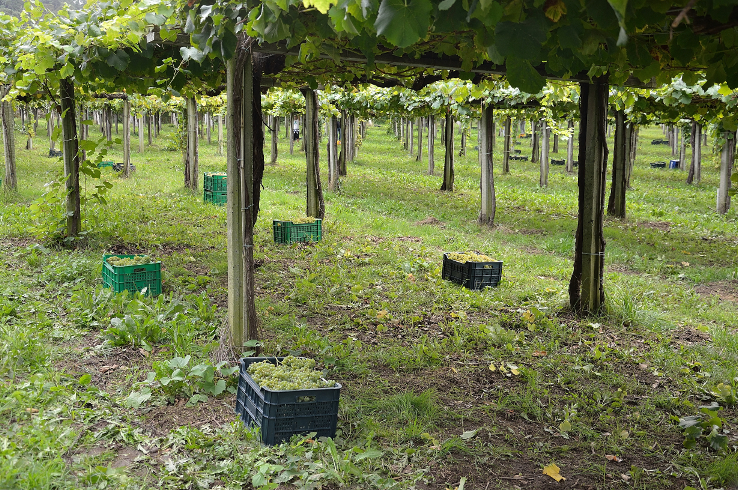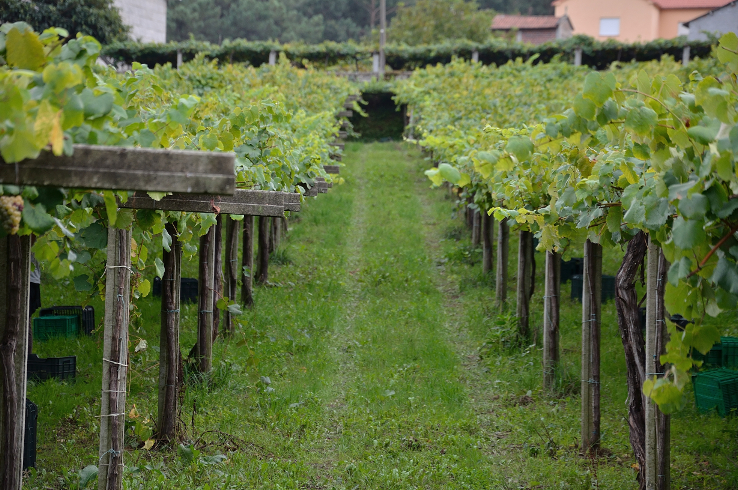2020 Viña Cartin Rías Baixas Albariño
Quintessential is the only word I can use to describe this wine. It comes from the ancestral home of Albariño, located directly on Spain’s Atlantic coast. It’s bright and refreshing… a solid weeknight staple.
Sustainable farming practices and hand-harvested.
- Tasting Notes Meyer lemon, clementine, citrus pith, honeydew, white grapefruit, marcona almond, sea salt
- Variety Albariño
- Region Spain, Rias Baixas
- Volume 750ml
- Alcohol Volume 13%
- Table Talk This wine comes from Val do Salnés, which many call the birthplace of Albariño.
Viña Cartín was founded in 1977 in Spain’s Salnés Valley, the oldest of Rias Baixas’ five subregions. In 2003, Viña Cartín moved their operations to a new location—an old winery in the heart of the area—and refurbished its interior with modern technology, yet maintained the estate’s artisanal character.
Contrary to the many regional wineries who purchase fruit, Viña Cartin proudly owns and sustainably farms 50 acres of their own vines. This direct access to the source allows them to control the raw material from start to finish. The estate’s vines average 30 years in age and benefit from the influence of the nearby Atlantic ocean. The resulting wines are bright, balanced, and laden with natural acidity.
ALBARINO
A pleasantly refreshing light white wine. Most known from Rias Baixas in Spain, but additionally as Vinho Verde in Portugal. Albariño’s are generally high in acid with refreshing citrus fruit flavors and a notably saline mineral character due to the regions’ proximity to the ocean. Serve these wines well-chilled while eating fish tacos on a hot summer day, you won’t be disappointed.
GALICIA, SPAIN
Part of what can be referred to as “Green” Spain, Galicia is located in the upper north west corner of the country. Wine production here dates back to the time of the Romans. It is one of the coolest areas producing refreshingly crisp Albariño with strong mineral characteristics as well as elegant red wine from the Mencía grape. Galicia boasts five denominated wine regions (DOs) including the infamous Rías Baixas, the closest DO to the Atlantic ocean.
Related Items
-
New Arrival
2024 Argaux Santa Ynez Valley Sauvignon Blanc
$30.00When we set out to create a Sauvignon Blanc, we had a clear vision: it had to be crisp, vibrant, effortlessly drinkable, and versatile enough to pair with just about anything. This bottle checks every box—and then some. Crafted by the incredibly talented Ernst Storm, it’s a wine that balances precision with pure pleasure. Bright, refreshing, and seriously delicious, this is the kind of Sauvignon Blanc you’ll keep reaching for.
Sustainable farming practices and hand-harvested at night to retain freshness. The wine was fermented cold in 100% stainless steel and aged on the lees for 6 months for added mouthfeel.
-
2023 Agricola Vadiaperti Greco di Tufo DOCG
$35.00Grown on volcanic soils in the hills just inland from the Amalfi Coast, the 2023 Vadiaperti Greco di Tufo is a crisp, textured white with mouthwatering vibrancy and a distinctive mineral edge that screams seafood. It’s a serious white wine with soul—complex, refreshing, and historic.
Practicing organic farming, Vadiaperti works with 30-year-old, high-elevation Greco vineyards that are entirely hand-harvested. The wine is fermented with native yeasts in stainless steel tanks and ages on the lees for up to two years.
-
2023 Punta Crena Vermentino Riviera Ligure di Ponente ‘Vigneto Isasco’62
$35.00For over 5 centuries, the Ruffino family has nurtured these vines that cling to the cliffs above the Ligurian Sea. Nicknamed “The Yachtsman’s White,” Vermentino is beloved for its breezy salinity, citrus lift, and mouthwatering freshness. It’s a vivid expression of the Riviera—sun-soaked, sea-sprayed, and utterly transportive.
Organic farming practices, hand-harvested, family-owned and less than 2,000 cases produced annually.
-
2024 La Bernarde ‘Les Hauts Du Luc’ Cotes de Provence Rosé
$25.00Les Hauts du Luc is a quintessential Provençal rosé crafted in the heart of the Coteaux Varois en Provence. Crisp, dry, and refreshingly elegant, it delivers the kind of effortless sophistication that makes it your go-to all summer long.
Certified organic farming practices, direct press, fermented and aged in stainless steel to preserve freshness.









